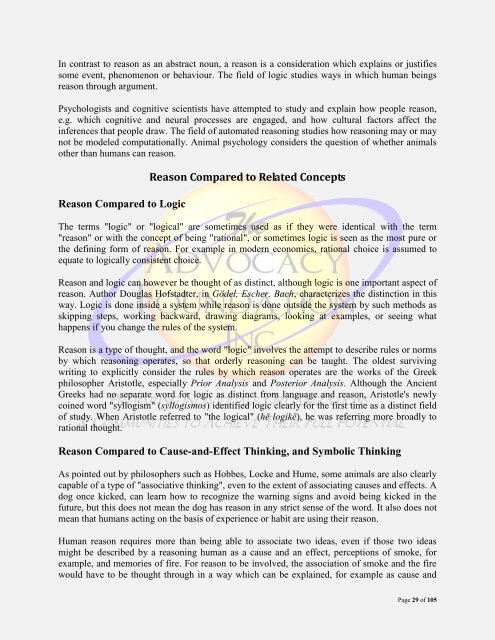Interpreting The Facts
Interpreting The Facts
Interpreting The Facts
You also want an ePaper? Increase the reach of your titles
YUMPU automatically turns print PDFs into web optimized ePapers that Google loves.
In contrast to reason as an abstract noun, a reason is a consideration which explains or justifies<br />
some event, phenomenon or behaviour. <strong>The</strong> field of logic studies ways in which human beings<br />
reason through argument.<br />
Psychologists and cognitive scientists have attempted to study and explain how people reason,<br />
e.g. which cognitive and neural processes are engaged, and how cultural factors affect the<br />
inferences that people draw. <strong>The</strong> field of automated reasoning studies how reasoning may or may<br />
not be modeled computationally. Animal psychology considers the question of whether animals<br />
other than humans can reason.<br />
Reason Compared to Logic<br />
Reason Compared to Related Concepts<br />
<strong>The</strong> terms "logic" or "logical" are sometimes used as if they were identical with the term<br />
"reason" or with the concept of being "rational", or sometimes logic is seen as the most pure or<br />
the defining form of reason. For example in modern economics, rational choice is assumed to<br />
equate to logically consistent choice.<br />
Reason and logic can however be thought of as distinct, although logic is one important aspect of<br />
reason. Author Douglas Hofstadter, in Gödel, Escher, Bach, characterizes the distinction in this<br />
way. Logic is done inside a system while reason is done outside the system by such methods as<br />
skipping steps, working backward, drawing diagrams, looking at examples, or seeing what<br />
happens if you change the rules of the system.<br />
Reason is a type of thought, and the word "logic" involves the attempt to describe rules or norms<br />
by which reasoning operates, so that orderly reasoning can be taught. <strong>The</strong> oldest surviving<br />
writing to explicitly consider the rules by which reason operates are the works of the Greek<br />
philosopher Aristotle, especially Prior Analysis and Posterior Analysis. Although the Ancient<br />
Greeks had no separate word for logic as distinct from language and reason, Aristotle's newly<br />
coined word "syllogism" (syllogismos) identified logic clearly for the first time as a distinct field<br />
of study. When Aristotle referred to "the logical" (hē logikē), he was referring more broadly to<br />
rational thought.<br />
Reason Compared to Cause-and-Effect Thinking, and Symbolic Thinking<br />
As pointed out by philosophers such as Hobbes, Locke and Hume, some animals are also clearly<br />
capable of a type of "associative thinking", even to the extent of associating causes and effects. A<br />
dog once kicked, can learn how to recognize the warning signs and avoid being kicked in the<br />
future, but this does not mean the dog has reason in any strict sense of the word. It also does not<br />
mean that humans acting on the basis of experience or habit are using their reason.<br />
Human reason requires more than being able to associate two ideas, even if those two ideas<br />
might be described by a reasoning human as a cause and an effect, perceptions of smoke, for<br />
example, and memories of fire. For reason to be involved, the association of smoke and the fire<br />
would have to be thought through in a way which can be explained, for example as cause and<br />
Page 29 of 105

















